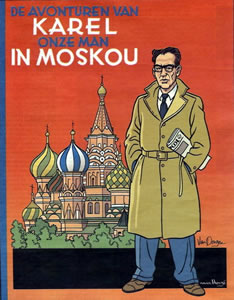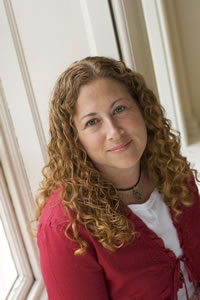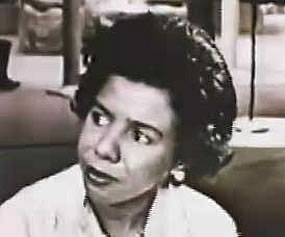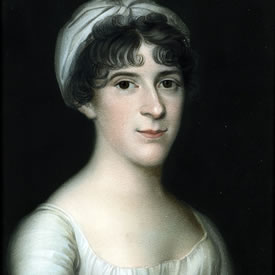De Nederlandse letterkundige, vertaler, essayist, schrijver en columnist Karel van het Reve werd geboren in Amsterdam op 19 mei 1921. Zie ook alle tags voor Karel van het Reve op dit blog.
Uit: De cornetto in het Bolsjoi
“De grondige studie van een enkel klein ding kan soms meer opleveren dan het streven naar inzicht in een Groot Geheel. Daarom zullen wij vandaag niet de hele Sowjet-economie behandelen, maar slechts een klein onderdeel ervan, nl. de juffrouw, die in de pauze ijs verkoopt in het Bolsjoitheater te Moskou. Dit seizoen ben ik daar twee keer geweest, de ene keer La Traviata en de andere keer Boris Godoenow. Beide keren heb ik in de pauze ijs gegeten.
Die juffrouw staat in de grote foyer beneden achter een tafel. Op die tafel staan een stuk of dertig ijscoupes, een pot jam met een lepel, en een weegschaal. Naast haar op de grond staat een bak met roomijs. Als je een bestelling bij haar plaatst, neemt ze eerst je geld in ontvangst, en dan zet ze een coupe op de weegschaal. Daarna is zij gedurende ongeveer een kwart minuut bezig om de coupe te vullen met honderd gram ijs, geen vijfennegentig of honderdvijf gram, maar honderd.
De tolerantie die haar toegestaan is, schijnt niet groter dan één gram te zijn. Daar het ijs aan de schep blijft kleven is het afwegen van honderd gram ijs. veel moeilijker dan het afwegen van een kilo suiker. Daarna voegt zij, zonder te wegen, een lepeltje smakelijke jam aan het zeer smakelijke ijs toe, en dan wendt ze zich met het bekende Russische verkopersgezicht (ingehouden woede) tot de volgende klant.
Zo’n pauze (het aantal pauzes is gelijk aan het aantal bedrijven min een) duurt een minuut of tien. In die tijd kan zij schat ik twintig mensen bedienen, die samen zo’n dertig porties ijs kopen. De Russische deskundigen, die ik hierover geraadpleegd heb spraken het vermoeden uit, dat tijdens het bewind van Stalin (1924-1963) een oekaze is uitgevaardigd volgens welke schepijs per gewicht verkocht moet worden. Die oekaze is nog steeds van kracht. De grote vraag is: waarom?”

Karel van het Reve (19 mei 1921 – 4 maart 1999)
Peter van Dongen tekende Reve in de stijl van Kuifje
De Amerikaanse schrijfster Jodi Lynn Picoult werd geboren op 18 mei 1966 in Nesconset op Long Island, New York. Zie ook alle tags voor Jodi Picoult op dit blog.
Uit: Keeping Faith
„In the middle of the night, Faith wakes up and curls her hands into fists. They hurt enough to make her whimper; just like the time Betsy Corcoran had dared her to hol
d onto the flagpole on the coldest day of last winter and her skin had near frozen right to the metal. She rolls over and stuffs her hands beneath her pillow, where the sheets are still cool.
But that doesn’t help, either. She fidgets a little bit more, wondering if she ought to get up and pee now that she’s awake, or just sit here and wait for her hands to stop hurting. She doesn’t want to go into her mother yet. Once she’d gotten up in the middle of the night and her foot had felt like the size of a watermelon and all tingly, but her mother said it was just pins and needles and to go back to bed. Even though there were no pins and needles on the floor, and when Faith had checked, there were none sticking out of the sole of her foot, either.
She rolls over again and sees her guard sitting on the edge of the bed. “My hands hurt,” she whimpers, and lifts them for inspection.
Her guard leans forward to look. “It will only hurt for a little while.”
That makes Faith feel better. It’s like when she’s hot and sick sometimes and her mother gives her the little pills that she knows will make her headache disappear. Faith watches her guard lift her left hand first, and then her right, and put a kiss right in the middle of each palm. Her lips are so warm that Faith jumps at first and pulls her hands back. When she looks down she can see it: her guard’s
kiss printed on her skin in a red circle. Thinking it is lipstick, Faith tries to rub at it with her thumb, but it
does not come off.“

Jodi Picoult (Nesconset, 19 mei 1966)
De Indiase dichter en schrijver Ruskin Bond werd geboren op 19 mei 1934 in Kasauli. Zie ook alle tags voor Ruskin Bond op dit blog.
These Simple Things
The simplest things in life are best-
A patch of green,
A small bird?s nest,
A drink of water, fresh and cold,
The taste of bread,
A song of old;
These are the things that matter most.
The laughter of a child,
A favorite book,
Flowers growing wild,
A cricket singing in a shady nook.
A ball that bounces high!
A summer shower,
A rainbow in the sky,
The touch of a loving hand,
And time to rest-
These simple things in life are best.
The Whistling Schoolboy
From the gorge above Gangotri
Down to Kochi by the sea,
The whistling thrush keeps singing
That same sweet melody.
He was a whistling schoolboy once,
Who heard god Krishna?s flute,
And tried to play the same sweet tune,
But touched a faulty note.
Said Krishna to the errant youth-
A bird you must become,
And you shall whistle all your days
Until your song is done.

Ruskin Bond (Kasauli, 19 mei 1934)
De Nederlandse dichter en schrijver Gijs IJlander (eig. Gijs Hoetjes) werd op 19 mei 1947 in Alkmaar geboren. Zie ook alle tags voor Gijs IJslander op dit blog.
Avondmaal
Haal mensen in huis, vraag om rijpe.
Kerf ze, overgiet met wijn,
Omwind met mager spek en
Laat ze vervolgens rusten.
Maak deeg met koele vingers,
Sla een kuil en vul met hart,
Strooi zout in wat nog open is,
Zorg voor harde boter.
Neem uzelf de maat,
Fruit evenveel tomaat en knoflook,
Met toewijding fijngehakt.
Kniel en ga te rade.
Dan:
Schenk af die marinade,
Schroei dicht met sissend vuur,
Het vet moet dansen in de pan.
Beweeg! Beweeg! Beweeg!
Maak vlees van alle woorden
Dien op met gruizig brood.
Gewoon. Zoals thuis.
Vergeet uzelf.

Gijs IJlander (Alkmaar, 19 mei 1947)
De Amerikaanse schrijfster Lorraine Hansberry werd geborenop 19 mei 1930 in Chigago. Zie ook alle tags voor Lorraine Hansberry op dit blog.
Uit: A Raisin in the Sun (Introductie door Robert Nemiroff)
„The play deserved all this-the playwright deserved all this, and more. Beyond question! But I have a feeling that for all she got, Lorraine Hansberry never got all she deserved in regard to A Raisin in the Sun-that she got success, but that in her success she was cheated, both as a writer and as a Negro.
One of the biggest selling points about Raisin-filling the grapevine, riding the word-of-mouth, laying the foundation for its wide, wide acceptance-was how much the Younger family was just like any other American family. Some people were ecstatic to find that “it didn’t really have to be about Negroes at all!” It was, rather, a walking, talking, living demonstration of our mythic conviction that, underneath, all of us Americans, color-ain’t-got-nothing-to-do-with-it, are pretty much alike. People are just people, whoever they are; and all they want is a chance to be like other people. This uncritical assumption, sentimentally held by the audience, powerfully fixed in the character of the powerful mother with whom everybody could identify, immediately and completely, made any other questions about the Youngers, and what liv
ing in the slums of Southside Chicago had done to them, not only irrelevant and impertinent, but also disloyal … because everybody who walked into the theater saw in Lena Younger … his own great American Mama. And that was decisive.

Lorraine Hansberry (19 mei 1930 – 12 januari 1965)
Zie voor de twee bovenstaande schrijvers ook mijn blog van 19 mei 2008 en ook mijn blog van 19 mei 2009.
De Duitse schrijver en vertaler Fritz Rudolf Fries werd geboren op 19 mei 1935 in Bilbao als zoon van een Duitse koopman.
Uit: Balladen von den blauen Fenstern (Pablo Neruda)
ICH LIEBE DIE SANFTMUT…
Ich liebe die Sanftmut, und trete
ich über die Schwelle einer Einsamkeit,
öffne ich die Augen und lasse sie überlaufen
von der Süße ihres Friedens.
Ich liebe die Sanftmut über
allen Dingen dieser Welt.
Ich finde in der Beruhigung der Dinge
ein großes und ein stummes Lied.
Die Augen zum Himmel wendend,
gewahre ich im Erschauern der Wolken,
im Vogel, der vorüberzieht, und im Wind
die große Süße der Sanftmut.
Vertaald door Fritz Rudolf Fries

Fritz Rudolf Fries (Bilbao, 19 mei 1935)
De Duitse schrijfster Rahel Varnhagen werd geboren op 19 mei 1771 in Berlijn.
Uit: Gedanken, Beobachtungen und Erinnerungen
“Freunde sind Menschen, die voneinander überzeugt sind; aber bald muß der eine, bald der andere alles leisten, ohne Kalkül anzustellen und je etwas dafür zu erhalten, noch zu erwarten, noch in sich zu fordern. Und so ist es auch in der Welt; wir haben Freunde, denen wir leisten, und Freunde, die uns leisten; und dies nach den verschiednen Naturen der Menschen und ihrer Lage gewähren zu lassen, grade darin besteht die Freundschaft. In allen andern Verhältnissen herrscht ja ein offener Handel. Ein Freund kann nur ein verehrtes Wesen sein, von dem wir, der Natur der Verehrung nach, nichts verlangen. Was wäre er sonst?
Wir lesen und hören von jeher: »Der Mensch kennt sich nicht selbst, der Dümmste kennt ihn besser als er sich; will er wissen, wie er ist, so muß er andere über sich hören, die sehen ihn, wie er eigentlich ist.« Mir kommt es ganz anders vor. Was wir für einen Eindruck machen, das können wir nur von anderen erfahren; und das auch von dem Dümmsten und Närrischsten; aber wie wir sind, weiß kein Mensch besser als wir selbst: und sei dieses Wissen auch noch so dunkel durch Verwirrung. Wir sehen uns konkav; und die andern sehen uns konvex: wiederhole ich hier. Es heißt auch: in einen Menschen hinein gehen, um ihn zu beurteilen. Aber jeder sitzt in sich selbst.”

Rahel Varnhagen (19 mei 1771 – 7 maart 1833)
Zie voor de twee bovenstaande schrijvers ook mijn blog van 19 mei 2007 en ook mijn blog van 19 mei 2009.

Hallo blogger!
Neem eens een kijkje op onze Facebook pagina en klik op ‘Vind ik leuk’.